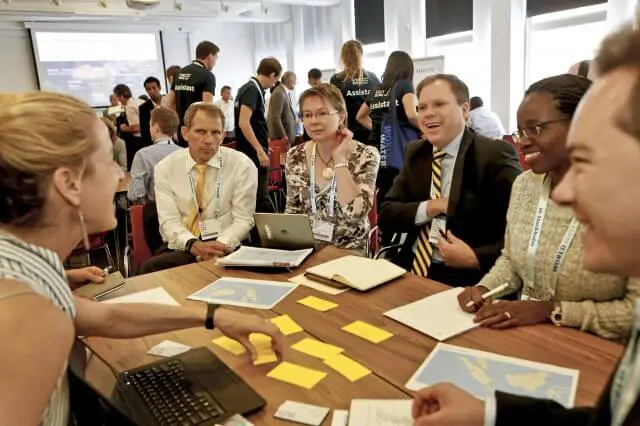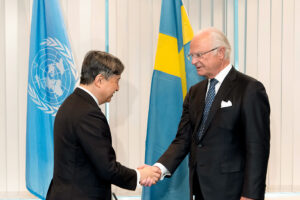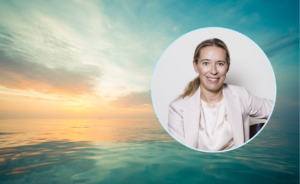Conclusions from World Water Week 2016
With some 3 200 participants from all over the world discussing Water for Sustainable Growth, the implementation of the water-related SDGs and the new climate agreement, WGF utilized the conference to put the spotlight on some of the most burning governance issues. The team co-convened several seminars and events, held bilateral meetings with key stakeholders and took the opportunity to exchange and share knowledge with the plethora of experts present.
Launch of the WGF Issue Sheets and welcome to Håkan Tropp – new WGF Director!

During the Week, WGF launched a series of issue sheets on Water Governance, Sanitation Governance, Human Rights, Integrity, Gender and Indigenous peoples. The issue sheets capture some of the core issues of good water governance that WGF is dealing with on a day-to-day basis and showcase how WGF works with each of these challenges. The issue sheets were presented during the annual WGF mingle at the UNDP booth.
At the mingle Andrew Hudson (UNDP) and Marianne Kjellén also took the opportunity to welcome Håkan Tropp as the new WGF Director. Marianne Kjellén wil, however, continue in close collaboration with the Facility team as the new UNDP Senior Water Advisor.
Good water governance for inclusive growth and poverty reduction
In a series of three sessions, the seminar explored the core dimensions of good water governance as outlined in the OECD Principles on Water Governance. The support to the achievement of the SDG 6 targets as well as SDG 2, 9, 12 and 17 were discussed in terms of tools and methodologies, successful case studies and indicators of good water governance, with a focus on local participation and IWRM.

WGF’s Dr Jenny Grönwall concluded the seminar and discussed the way forward, pointing out that even if private sector involvement is important it can also create risks related to reputation and sustainable use of natural resources. She also highlighted that trust is crucial in governance in particular in Multi-Stakeholder Platforms, but that structural challenges, unethical behaviour and cultural norms permeate the governance landscape contributing to hidden power asymmetries in Water Operators’ Partnerships. Further, the sector governance framework needs to be adapted to enable the work towards the SDGs.
Co-conveners: WGF, IWMI, OECD, SIWI and WRC
Water for sustainable and inclusive cities: how to induce change?
UNDP Senior Water Advisor Marianne Kjellén introduced and moderated the first session of the seminar showcasing several ways to manage the urban water cycle and the environment more sustainably. These models are often a result of different parts of the city administration and stakeholders coming together to discuss the different purposes and uses of the city. The final policy panel suggested that the most critical elements to generate a change towards greater sustainability were
- Political will and vision
- Leadership
- Collaboration
- Communication
- Public Awareness
- Education
- Information, and
- Transparency.
Co-convenors: GWOPA, GWP, the World Bank and WEF
City-wide sanitation services: recent thinking and experiences

Urban sanitation is a key challenge in the pathway towards the Sustainable Development Goal’s ambition of Universal Access by 2030, due to both the rapid informal urbanisation processes and the lack of clarity on how to deliver sustainable sanitation services city-wide, with inclusion of the poor.
The event shed light on the latest thinking on planning and delivering sanitation city-wide. In a marketplace set-up organizations presented their experiences from cities across the globe, such as Maputo (Mozambique), Vitoria (Brazil), Visakhapatnam (India), Dakar (Senegal) and Sawahlunto (Indonesia). The different approaches to urban sanitation were presented, followed by group work to share experiences related to Tailoring approaches, Political priority, Collaboration and Research.
Co-conveners: WGF, WaterAid, GIZ, SuSanA and the World Bank
WASH services in Fragile States: Accountability for sustainable service delivery
In fragile states governments and their donors face an accountability dilemma; state bureaucracies lack capacity to deliver economic benefits that meet citizen’s expectations. Yet, delivering urgently needed services through non-state actors can be at the expense of building citizen-state accountability.
The event explored ways to strengthen accountability for service delivery in order to rebalance the trade-off between constructing water supply infrastructure and building the institutions that deliver sustainable water supply services. Alejandro Jiménez from WGF, highlighted the need to do a careful analysis of the relations among citizens, state, providers and donors when programming.
Recent work by UNICEF and WGF and the World Bank on WASH services in fragile states was brought to illustrate ways that transparency and accountability can be realigned to ensure that investment in WASH strengthens – not undermines – the relationship between service delivery and state-building.
Co-conveners: WGF, UNICEF and the World Bank
Realizing SDG’s through sanctions, rewards, and learning from experiences
The event explored how universal WASH service delivery can be realized by improving democratic accountability in service delivery through the use of sanctions, rewards, and mechanisms for learning from experiences. The discussion demonstrated that all three approaches are challenging and context specific, and can even be counterproductive if not designed and enforced properly. Successful cases show that all of them require an iterative process to monitor and fine tune different mechanisms to serve their purpose. In addition, the combination of all these mechanisms is likely to work better than separated. Finally, it is essential to develop trust among key stakeholders for any of the approaches to be useful. Therefore, a learning processes can be a meaningful starting point.
Co-conveners: WGF, International IDEA and Forum Syd
Is sustainability truly compatible with access to water and sanitation?
WGF’s Alejandro Jiménez participated in the panel of the event discussing the main challenges of achieving universal coverage of water and sanitation services, both in financial and technical terms. The panel discussion was captured in an article by The Guardian.
Co-conveners: FEMSA Foundation, Guardian Development Professionals Network and SIWI
Strengthen Water Governance through Integrity and Sustainable Financing
The event was organised as part of the Middle-East and North Africa (MENA) focus day with a panel composed of high-level operational water staff from the MENA region, including a water division director, a representative from IUCN, a Water Ministry Secretary General, and a gender expert. The panellists discussed how to find solid mechanisms to increase efficiency, optimisation of resources, investments and the sustainability of the sector.
Co-conveners: WGF and the GWP-Med
Source to Sea – bridging marine and freshwater SDGs
Discussing the links and trade-offs among upstream and downstream activities, the event explored what actions can be taken to enable sustainable growth and realization of the SDGs looking at water systems from their source to the sea. Andrew Hudson, from the UNDP Water and Oceans Governance Programme (WOGP) delivered the keynote address, emphasizing the need for accelerated action and increased financial input to reach the majority of freshwater and marine targets. The inter-linkages also need to be more widely recognised.
The event emphasized the importance of collaboration with productive sectors to achieve more effective resource use. To increase the benefits and reduce negative impacts of development in connected ecosystems it is essential that more nexus and source-to-sea approaches are applied. In short, upstream and downstream stakeholders need to work together and have a better understanding of the legal instruments that are available.
Co-conveners: UNDP, SIWI, the Action Platform on Source to Sea Management, UNEP-GPA and the Swedish Agency for Marine and Water Management
The missing link – recognising women’s invisible water work

Co-conveners: WGF, Aquafed, BORDA, ILO, and Women for Water Partnership
Water fetching – women’s unpaid water work represents a large and unnecessary burden, a highly inefficient use of social resources and puts women and girls at risk. Bringing together researchers, civil society, union representatives and the private sector, the event explored the latest research related to the extent of water fetching globally. The data was drawn from a joint research project between WGF, ILO and the University of East Anglia (UEA), linking it also to the health impacts of water fetching. The closing panel discussed actions to be taken by the different actors, highlighting the importance of improved data and recognising also unpaid water work as work.
Meetings and bilateral discussions
The World Water Week was also the locus of many separate meetings, including the annual steering committee meeting of the UNDP-SIWI Water Governance Facility. The WGF team took the opportunity to meet up with the delegation from Madagascar, headed by the Minister of Water, Sanitation and Hygiene, the delegation from Palestine and representatives from the water ministries and utilities from Argentina, Costa Rica and Ecuador, as well as private sector and other international organizations, to strengthen on-going collaboration and identify new opportunities.








